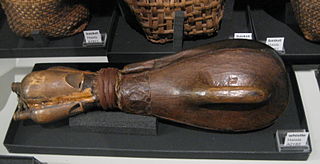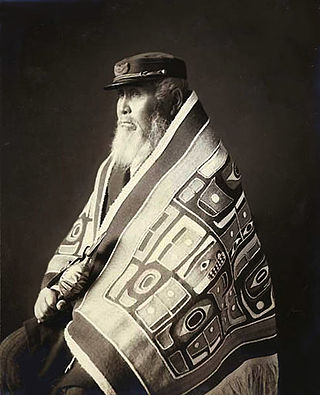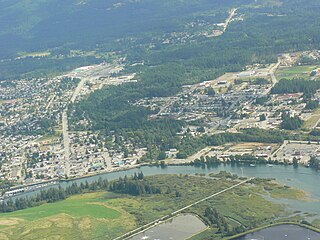Related Research Articles

A potlatch is a gift-giving feast practiced by Indigenous peoples of the Pacific Northwest Coast of Canada and the United States, among whom it is traditionally the primary governmental institution, legislative body, and economic system. This includes the Heiltsuk, Haida, Nuxalk, Tlingit, Makah, Tsimshian, Nuu-chah-nulth, Kwakwaka'wakw, and Coast Salish cultures. Potlatches are also a common feature of the peoples of the Interior and of the Subarctic adjoining the Northwest Coast, although mostly without the elaborate ritual and gift-giving economy of the coastal peoples.

The Kwakwa̱ka̱ʼwakw, also known as the Kwakiutl, are one of the indigenous peoples of the Pacific Northwest Coast. Their current population, according to a 2016 census, is 3,665. Most live in their traditional territory on northern Vancouver Island, nearby smaller islands including the Discovery Islands, and the adjacent British Columbia mainland. Some also live outside their homelands in urban areas such as Victoria and Vancouver. They are politically organized into 13 band governments.

The Nuu-chah-nulth, also formerly referred to as the Nootka, Nutka, Aht, Nuuchahnulth or Tahkaht, are one of the Indigenous peoples of the Pacific Northwest Coast in Canada. The term Nuu-chah-nulth is used to describe fifteen related tribes whose traditional home is on the west coast of Vancouver Island.
First Nations is a term used to identify Indigenous Canadian peoples who are neither Inuit nor Métis. Traditionally, First Nations in Canada were peoples who lived south of the tree line, and mainly south of the Arctic Circle. There are 634 recognized First Nations governments or bands across Canada. Roughly half are located in the provinces of Ontario and British Columbia.

Port Alberni is a city located on Vancouver Island in the province of British Columbia, Canada. The city lies within the Alberni Valley at the head of the Alberni Inlet, Vancouver Island's longest inlet. It is the location of the head offices of the Alberni-Clayoquot Regional District. Port Alberni currently has a total population of 18,259.

Chief Dan George was a chief of the Tsleil-Waututh Nation, a Coast Salish band whose Indian reserve is located on Burrard Inlet in the southeast area of the District of North Vancouver, British Columbia, Canada. He also was an actor, musician, poet and an author. The Chief's best-known written work is "My Heart Soars". As an actor, he is best remembered for portraying Old Lodge Skins opposite Dustin Hoffman in Little Big Man (1970), for which he was nominated for the Academy Award for Best Supporting Actor, and for his role in The Outlaw Josey Wales (1976), as Lone Watie, opposite Clint Eastwood.

The Haisla are an amalgamation of two bands, the Kitamaat people of upper Douglas Channel and Devastation Channel and the Kitlope People of upper Princess Royal Channel and Gardner Canal in British Columbia, Canada.

Tseshaht First Nation is an amalgamation of many tribes up and down Alberni Inlet and in the Alberni Valley of central Vancouver Island in the Canadian province of British Columbia. They are a member of the Nuu-chah-nulth Tribal Council which includes all other Nuu-chah-nulth-aht peoples except the Pacheedaht First Nation.
The Nuu-chah-nulth Tribal Council is a First Nations Tribal Council in the Canadian province of British Columbia, located on the west coast of Vancouver Island. The organization is based in Port Alberni, British Columbia.

Douglas Lowell Cole was an American-Canadian historian. Cole specialized in the art and culture of the Northwest Pacific Coast, and from 1966 until 1997 served as a professor in the history department at Simon Fraser University.

The Indigenous peoples of the Pacific Northwest Coast are composed of many nations and tribal affiliations, each with distinctive cultural and political identities. They share certain beliefs, traditions and practices, such as the centrality of salmon as a resource and spiritual symbol, and many cultivation and subsistence practices. The term Northwest Coast or North West Coast is used in anthropology to refer to the groups of Indigenous people residing along the coast of what is now called British Columbia, Washington State, parts of Alaska, Oregon, and Northern California. The term Pacific Northwest is largely used in the American context.
(Barbara) Anne Cameron was a Canadian novelist, poet, screenwriter, short story and children's book writer.

Alberni Valley is a broad valley located at the head of Alberni Inlet on Vancouver Island in British Columbia, Canada. It is home to Port Alberni, Sproat Lake and other outlining areas. The term is largely used as a synonym for Greater Port Alberni and adjoining communities but is used in a larger regional sense as well. Various local organizations and companies use the term "Alberni Valley" in their name, e.g. the Alberni Valley Times and Alberni Valley News newspapers the Alberni Valley Chamber of Commerce and the Alberni Valley Bulldogs minor hockey team. The Canadian pioneer, Joe Drinkwater lived in Alberni Valley during the late nineteenth and early twentieth centuries.
Alec Thomas was born around 1894 near Alberni, British Columbia, Canada. He was a fisherman, trapper, longshoreman, interpreter, self-taught anthropologist, and Tseshaht politician. Alec had a wife named Eva and also had a son named Bob. With him being a trapper he would lay traps for 14 miles between 2 bodies of water, the Somass River and Sprout Lake. At the end of the day, he would check each one with his wife and son, walking through his miles of traps. This is what he did for a living, hunting different animals such as fish and beavers.

Somass River is a river on Vancouver Island, in the Canadian province of British Columbia. Its drainage basin is 1,412 square kilometres (545 sq mi) in size.
Over the course of centuries, many Indigenous Canadians have played a critical role in shaping the history of Canada. From art and music, to law and government, to sports and war; Indigenous customs and culture have had a strong influences on defining Canadian culture. The Indspire Awards are the annual awards presented by Indspire, formerly the National Aboriginal Achievement Foundation. The awards were first established in 1993 in conjunction with the United Nations declaring the 1990s "International Decade of the World's Indigenous peoples". June 21 is Canada's National Aboriginal Day, in recognition of the cultural contributions made by Canada's indigenous population. The day was first celebrated in 1996 following Governor General of Canada Roméo LeBlanc's proclamation.
The following is an alphabetical list of topics related to Indigenous peoples in Canada, comprising the First Nations, Inuit and Métis peoples.

The potlatch ban was legislation forbidding the practice of the potlatch passed by the Government of Canada, begun in 1885 and lasting until 1951.
Andy Everson is a contemporary Indigenous Artist born in Comox, British Columbia. He was named Nagedzi after Chief Andy Frank, who was his grandfather. His artworks are greatly influenced by his Comox and Kwakwaka'wakw ancestries. His artwork is said to be "magnificent, beautiful and bountiful and presents strong imagery, tells a tale, sings a song, passes on a legend, dispels myth and in general fills the spirit and the body with a renewed respect".
References
- 1 2 3 4 Clutesi, George. "Tseshaht First Nation: history-culture/influential figures". tsehaht.com. Tseshaht First Nation. Retrieved 17 September 2020.
- ↑ "- First Nation's Art IN B.C.- BC Archives Time Machine. Online. 10 October 2007". Archived from the original on 30 April 2007. Retrieved 10 October 2007.
- ↑ Rollin Art Center: Robert Aller Exhibit, George Clutesi. Online. 13 October 2007.
- ↑ Native American Authors: . Online 9 October 2007
- ↑ IMDB. Biography for George Clutesi. Online. 13 October 2007.
- ↑ George Clutesi at Internet Movie Database
- ↑ "The Film Reference Library. Dreamspeaker. Online. 13 October 2007". Archived from the original on 12 October 2007. Retrieved 13 October 2007.
- ↑ ABCBookWorld, Clutesi, George. Online. 10 October 2007